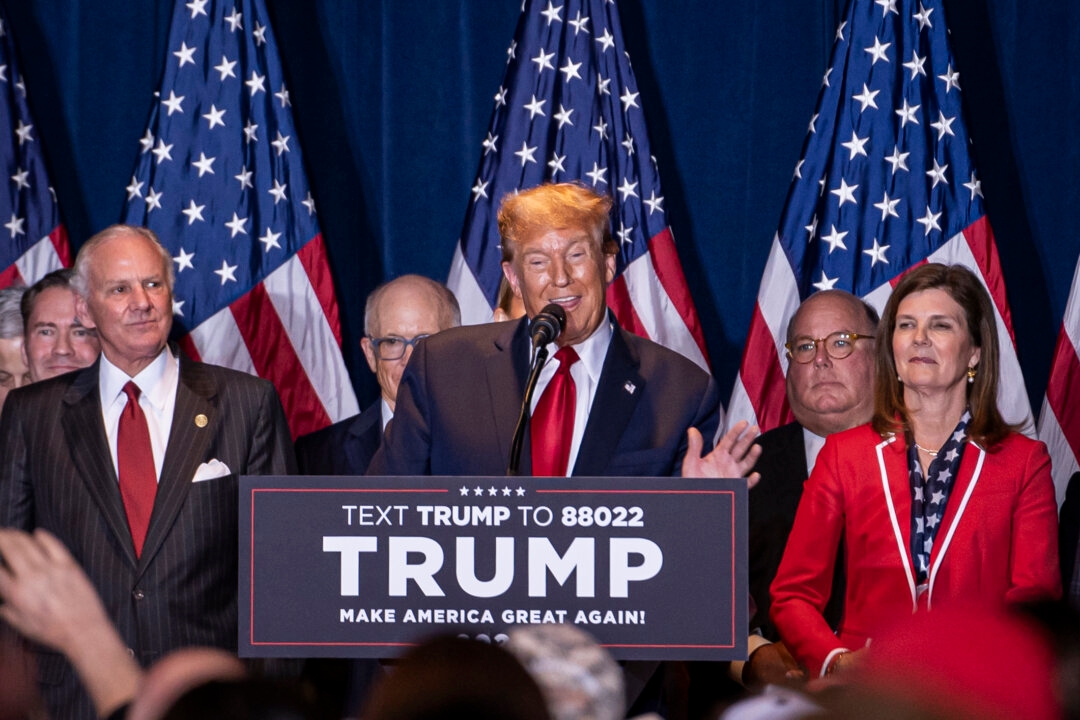The margin of victory and the trajectory of the race offer insights into the future of the 2024 nominating contest.
President Donald Trump notched another decisive win in the Republican presidential primary, former governor Nikki Haley in her home state of South Carolina.

Given the lopsided polling in this two-person race between President Trump and Ms. Haley, the outcome of the Feb. 24 contest was never in doubt.
Yet the margin of victory and the trajectory of the race after this fourth presidential primary provide insights into the future of the 2024 nominating contest.
Trump Notches Highest Percentage in Contested Race So Far
President Trump called the result of the contest decisive shortly after the polls closed, and major media outlets called the race in his favor the moment the polls closed. In a message to supporters, he declared the result a “complete and total victory.”
Indeed, at approximately 60 percent of the vote as of 9:35 p.m. ET on Saturday, his share of the total was the highest of the three primaries in which he has faced opposition.
President Trump won the Iowa caucuses with 51 percent of the vote, beating three principal challengers, including Ms. Haley. She earned 19 percent of the vote.
In New Hampshire, President Trump bested Ms. Haley by 54 to 43 percent.
In the Nevada caucuses, President Trump was unopposed, garnering 99 percent of the vote.
Given the growing momentum of the Trump campaign and Ms. Haley’s inability to achieve a breakout result, the former president appears set to claim the nomination within weeks.
Yet despite losing three times to President Trump, Ms. Haley maintains that her ability to claim approximately 40 percent of the vote in two head-to-head contests indicates that Republican voters are seeking a Trump alternative.
“There are huge numbers of voters in our Republican primaries who are saying they want an alternative,” Ms. Haley told supporters at an after-election party.
But Rep. Ralph Norman (R-S.C.), one of Haley’s top advocates, saw it differently.
“The people spoke for Trump,” Mr. Norman told The Epoch Times after the results.
“What she will have to do … is make a decision,” he added.
Asked about her future in the race after Super Tuesday, March 5, Mr. Norman said, “What she’ll do is count the delegates up.” He added, “At the end of the day, everybody will come together, whether it’s [for] Nikki Haley or Donald Trump.”

Haley Loses Her Home State
Ms. Haley’s primary loss in her home state, where she was twice elected governor, is nearly unprecedented. Since the modern primary system began in 1972, no major-party candidate has claimed the nomination after losing their home state.
Ms. Haley’s defeat is partly attributable to President Trump’s overwhelming popularity in the state.
The former president handily won the 2016 primary here and has remained popular. He garnered the lion’s share of endorsements from the state’s elected officials, including the governor, lieutenant governor, and attorney general as well as U.S. Sens. Lindsey Graham and Tim Scott, both Republicans.
Rep. Ralph Norman (R-S.C.) was the state’s only high-profile figure to endorse Ms. Haley.
Ms. Haley’s reputation as a governor is mixed among voters. To some, she is seen as a capable governor who provided outstanding crisis leadership.
“She was our governor during some of the darkest times we had. She led us well,” Ashley Brown, 43, or Moncks Corner, told The Epoch Times.
The state endured significant flooding during Ms. Haley’s tenure, as well as the mass shooting that claimed nine lives at a historic Black church in Charleston.
Other Republican voters were less impressed with Ms. Haley’s governance.
“I didn’t care for her when she was governor,” Richard Hinson, 58, of Moncks Corner, told The Epoch Times. “She’s just a career politician.”
Haley’s Chances Dim Further
Ms. Haley’s chances of winning the nomination, slim even before this contest, are now minuscule.
The Palmetto State has been something of a bellwether in the Republican nominating system, correctly forecasting the eventual nominee in every contest since 1980 with just one exception. The state went for Newt Gingrich in 2012.
More telling is the rate at which President Trump has collected committed delegates to the Republican National Committee’s July nominating convention.
To win the party’s nomination, a candidate must secure a commitment from 1,215 of the 2,429 delegates from the 50 states and various territories. After winning South Carolina’s 50 delegates, President Trump now has 139 to Ms. Haley’s 20.
Another 1,215 delegates will be awarded on Super Tuesday, March 5, when 15 states hold primary elections or caucuses. If Ms. Haley is unable to gain a healthy share of those delegates, the race will be effectively over.
“I don’t have an exact estimate here, but mid-March, late-March” is when Ms. Haley is likely to acknowledge her campaign is moot, according to Josh Putnam, a political science professor at the University of Georgia.
“Haley seems to suggest that she’s going to hang around at least through Super Tuesday, so if she dropped out after that, then it’s going to probably happen just before Trump passes the 50-percent mark and unofficially clinches the nomination,” Mr. Putnam said.

Crossover Voters Opt for Haley
Voter registration by party is not required in South Carolina, so any voter may choose to participate in either the Republican or Democratic primary, but not both.
Exit polls showed that 69 percent of voters identified themselves as Republicans, 21 percent as independents, 6 percent as something else, and 4 percent as Democrats.
Some crossover voters were apparently motivated by a desire to oppose President Trump. Others were simply pro-Haley.
“I’ve already voted for Nikki,” Kurt Kehelbeck, 64, of Charleston, told the Epoch Times, having cast his ballot during the early voting period. “I’m a Democrat. Anything’s better than Trump.” Mr. Kehelenbeck said he intended to vote for President Biden in the general election.
Democratic leaders were aware that a number of their constituents intended to oppose President Trump by voting for Ms. Haley.
“I do know a significant amount of people … who are going to go with what they feel, and they have this feeling that they have to vote against Donald Trump,” Marcurius Byrd told The Epoch Times. Mr. Byrd of Columbia is the senior adviser to the Central Midlands chapter of South Carolina Young Democrats.
That number, 4 percent of the vote at best, was not a factor in deciding the race.
What does not appear to have materialized is a large crossover vote in support of President Trump as was predicted by South Carolina GOP Chair Drew McKissick.
“You will see a huge number, if not a majority, of self-identified Democrats who say that they voted for Donald Trump in this primary,” Mr. McKissick told The Epoch Times on Feb. 24.
Given the slight increase in Ms. Haley’s support versus polling predictions, it appears that she gained whatever benefit was to be had from crossover voting.

Spotlight Expands to Down-Ballot Races
With President Biden now unopposed for the Democratic nomination and President Trump all but certain to gain the Republican nod, attention will shift down the ballot to races for Congress and state legislatures.
On Super Tuesday, California, Texas, North Carolina, Alabama, and Arkansas will hold general primaries as well as presidential polls.
Voters across the four Southern states will nominate candidates for 63 House districts, including 42 held by Republicans.
In California, seven of the 10 most hotly contested congressional races are for GOP-held seats. President Biden carried five of those districts in 2020. Four of them are rated as toss-ups by Cook Political Report.
In all, voters will select candidates for 115 congressional districts representing more than a quarter of the House of Representatives on March 5.
In the coming months, primaries will also be held for 34 Senate seats, 20 of which are held by Democrats, 11 by Republicans, and three by independents. Primaries will also be held for 11 gubernatorial elections, with eight of those seats currently held by Republicans.
Among the most watched congressional races will be for California’s 22nd district, held by Republican David Valadao, which the Democratic National Committee hopes to flip in 2024. Some 42 percent of registered voters in the 22nd District are Democrats, and just under 27 percent are Republicans.
California’s 27th congressional district, held by Republican Mike Garcia, is also on the Democratic National Committee’s hit list. Democrat George Whitesides is the strongest challenger. He is a former chief of staff at NASA and is CEO of Virgin Galactic.
California’s senatorial primary will also be closely watched. Primaries in this state are nonpartisan, meaning that all candidates compete on a single ballot, with the top two vote-getters advancing to the general election.
The leading candidates in this heavily Democratic state appear to be Democrats Adam Schiff and Katie Porter, both of whom currently represent House districts. Former professional baseball player Steve Garvey is the leading Republican candidate.
John Haughey, Janice Hisle, and Nathan Worcester contributed to this report.
